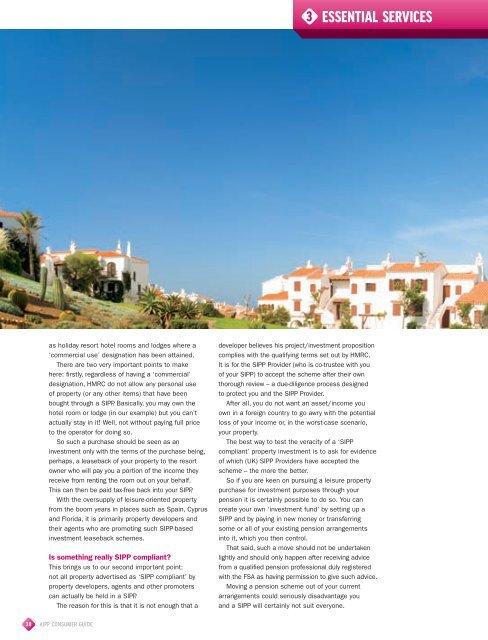HOW TO BUY - Target Markets- Global Property Investment
HOW TO BUY - Target Markets- Global Property Investment
HOW TO BUY - Target Markets- Global Property Investment
Create successful ePaper yourself
Turn your PDF publications into a flip-book with our unique Google optimized e-Paper software.
as holiday resort hotel rooms and lodges where a<br />
‘commercial use’ designation has been attained.<br />
There are two very important points to make<br />
here: fi rstly, regardless of having a ‘commercial’<br />
designation, HMRC do not allow any personal use<br />
of property (or any other items) that have been<br />
bought through a SIPP. Basically, you may own the<br />
hotel room or lodge (in our example) but you can’t<br />
actually stay in it! Well, not without paying full price<br />
to the operator for doing so.<br />
So such a purchase should be seen as an<br />
investment only with the terms of the purchase being,<br />
perhaps, a leaseback of your property to the resort<br />
owner who will pay you a portion of the income they<br />
receive from renting the room out on your behalf.<br />
This can then be paid tax-free back into your SIPP.<br />
With the oversupply of leisure-oriented property<br />
from the boom years in places such as Spain, Cyprus<br />
and Florida, it is primarily property developers and<br />
their agents who are promoting such SIPP-based<br />
investment leaseback schemes.<br />
Is something really SIPP compliant?<br />
This brings us to our second important point:<br />
not all property advertised as ‘SIPP compliant’ by<br />
property developers, agents and other promoters<br />
can actually be held in a SIPP.<br />
The reason for this is that it is not enough that a<br />
30 AIPP CONSUMER GUIDE<br />
3 ESSENTIAL SERVICES<br />
developer believes his project/investment proposition<br />
complies with the qualifying terms set out by HMRC.<br />
It is for the SIPP Provider (who is co-trustee with you<br />
of your SIPP) to accept the scheme after their own<br />
thorough review – a due-diligence process designed<br />
to protect you and the SIPP Provider.<br />
After all, you do not want an asset/income you<br />
own in a foreign country to go awry with the potential<br />
loss of your income or, in the worst-case scenario,<br />
your property.<br />
The best way to test the veracity of a ‘SIPP<br />
compliant’ property investment is to ask for evidence<br />
of which (UK) SIPP Providers have accepted the<br />
scheme – the more the better.<br />
So if you are keen on pursuing a leisure property<br />
purchase for investment purposes through your<br />
pension it is certainly possible to do so. You can<br />
create your own ‘investment fund’ by setting up a<br />
SIPP and by paying in new money or transferring<br />
some or all of your existing pension arrangements<br />
into it, which you then control.<br />
That said, such a move should not be undertaken<br />
lightly and should only happen after receiving advice<br />
from a qualifi ed pension professional duly registered<br />
with the FSA as having permission to give such advice.<br />
Moving a pension scheme out of your current<br />
arrangements could seriously disadvantage you<br />
and a SIPP will certainly not suit everyone.


